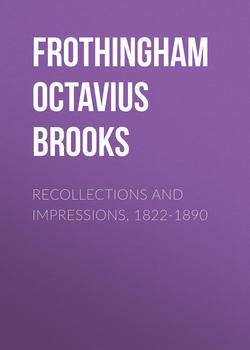Recollections and Impressions, 1822-1890

Реклама. ООО «ЛитРес», ИНН: 7719571260.
Оглавление
Frothingham Octavius Brooks. Recollections and Impressions, 1822-1890
I. PARENTAGE
II. EDUCATION
III. DIVINITY SCHOOL
IV. SALEM
V. THE CRISIS IN BELIEF
VI. JERSEY CITY
VII. NEW YORK
VIII. WAR
IX. THE FREE RELIGIOUS ASSOCIATION
X. THE PROGRESS OF RELIGIOUS THOUGHT IN AMERICA
XI. THE CLERICAL PROFESSION
XII. MY TEACHERS
XIII. MY COMPANIONS
XIV. MY FRIENDS
XV. THE PRESENT SITUATION
XVI. THE RELIGIOUS FUTURE OF AMERICA
XVII. CONFESSIONS
Отрывок из книги
Of the primary schools it is unnecessary to speak. They were of the same kind that were established in Boston at that period. Indeed I can recollect but two, one, a child's school of boys and girls, kept by a Miss Scott, at the corner of Mt. Vernon Street and Hancock; the other a boys' school kept by a Mr. Capen, a poor hump-backed cripple who could not get out of his chair, but wheeled himself about the room, and kept on his table a cowhide, which was pretty generously exercised. The school was on Bedford Street behind the "Church of Church Green." A little alley-way ran along in the rear of the church through which I used to go to the school-house.
The Latin School was an old institution brought hither by Rev. John Cotton, who remembered the Free Grammar School founded in Lincolnshire, England, by Queen Mary, in which Latin and Greek were taught. It was established here, in 1635, five years after the landing of Winthrop, two or three years before Harvard College. When I was there, it stood on School Street, opposite the Franklin statue. It had a granite front and a cupola. The head-master was Charles K. Dillaway, an excellent scholar, a faithful teacher, an agreeable man. He had to resign in consequence of ill-health. The tutors were Henry W. Torrey and Francis Gardner, who afterwards became head-master. Both were pupils of the school. Mr. Frederick P. Leverett, author of the Latin Lexicon, was chosen to succeed Mr. Dillaway, but died before assuming the office. The next head-master, during my course, was Epes Sargent Dixwell, a most accomplished man, an elegant scholar, a gentleman of the world, very much interested, as I remember, in the plastic art of Greece. He is still living, and amuses himself by writing Greek. Mr. Dixwell held office till 1851, when he established a private school. The discipline of the Latin School was strict but mild. Corporal punishment was the unquestioned rule, but it was never harshly administered, though the knowledge that it might be undoubtedly did a good deal toward stimulating the ambition of the scholars. Here and there no doubt a boy exasperated the teacher by idleness or disorder; possibly at moments the teacher was nervous and irritable. I recollect a single instance in which he was over-sensitive, too prone to take offence, which fastened suspiciously upon some individual scholar; but injustice was a very rare occurrence. We learned Greek and Latin, the rudiments of algebra, writing and declamation; but the best part of the education I received in those days was an atmosphere of elegant literature, derived from friends of my father. I used to see William H. Prescott taking his walk on Beacon Street, in the sun, and have often sat in his study in his tranquil hours, and heard him talk. The beautiful library of George Ticknor, at the head of Park Street, was open to me, and I can see his form now as he walked on the Common. George S. Hillard, the elegant man of letters, was a familiar figure on the street. Charles Sumner, then a young law student, strode vigorously along, his manner even then suggesting the advent of a new era.
.....
There were excitements too. Though there was no gymnasium, or boating, and little foot-ball, base-ball, or cricket (these games were all very simple and rudimentary), there were the clubs, the "ΑΔΦ," still a secret society, and occupying a back upper room, to which we mounted by stealth, – the same room serving for initiations and sociables, – was exceedingly interesting in a literary point of view. There were papers on Scott, Byron, Wordsworth, delightful conversations, anecdotes, songs.
The "Institute of 1770" taught us elocution, and readiness in debate; the "ΦΒΚ," no longer a secret society, and no longer actively literary, hung over us like a star, stimulating ambition and inciting us to excellence in scholarship.
.....